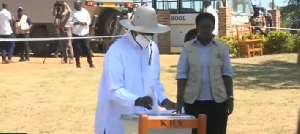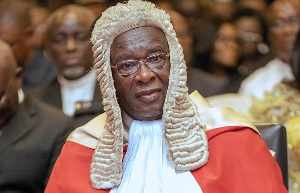Chapter 1
Scheduled to depart on Saturday 8th Feb. 2003 aboard Ghana Airways flight 750, I arrived at London’s Heathrow in time for pre-flight formalities. After making my way to the desk of Ghana Airways, I was to find the place totally deserted.What could be happening? Have I got to the airport too late? Have I always got the date wrong? None of the above. The answer will become apparent later and will demonstrate how grossly inept the management of Ghana Airways is. More importantly, it will give a foretaste of the attitude, which we bring to running business back home.
It’s just amazing that we constantly cry poverty while systematically doing the very things that will perpetuate our plight. What is that? Paralysis of creative thought; innate incapacity to spot the obvious; secret delight with playing victimhood? If I ever had any reservations about the validity of our desire to blame our under-development on our financial poverty, my observations at home, helpfully trailed by Ghana Airways ineptitude was to confirm everything for me.
After frantically probing various sources for information about whatever happened to flight 750, I was advised to return home and inquire from Ghana Airways the following day about when the flight will take off if indeed it hadn’t already. With that advice from the airport’s information desk, I hauled my luggage back home.
The next morning being a Sunday, I called the airline’s office but unsurprisingly, no one answered. I somehow managed to get Kotoka International Airport's number only to learn that actually, a Ghana Airways plane did leave Heathrow for Accra the previous day, only it left in the morning. That in fact was the previous Thursday’s flight re-scheduled for Saturday morning. Apparently, Ghana Airways’ management had sometime earlier decided on re-scheduling of flight days, hence a number of backlogs to clear.
One would have thought that a major announcement would be put out via various channels of communication to inform customers. However, typical of the Ghanaian way of doing business, particularly in public corporations, customers are just not important. Their satisfaction is not a priority. Their needs are simply incidental. Isn’t that a sad reflection on our business leaders?
I was later advised to go to the airport in the evening to check my luggage in after which I’ll be taken to a hotel nearby to pass the night, for the flight would be on Monday the 10th of Feb. Of course, I wasn’t getting an exclusive VIP treatment. About 20 passengers got this hospitality. Others took up the option of an extra 10kilos of weight to their luggage. The total cost of this extra expenditure could not be less than $2000, which is on the low side of any range of estimate. It’s hard for anyone to challenge the conclusion that this was an entirely avoidable expenditure, if only obvious decisions had been taken in time. But of course, Ghana Airways Corporation belongs to the people of Ghana, who have elected to do things via the costly route, so that we can turn round and blame our situation on the lack of money after we deftly fritter it away. As if money grows on trees. Of course, it’s hard not to believe that someone or people within the top hierarchy of the corporation do not directly benefit from such inept decisions. If in doubt, then why such persistent occurrence of delays and cancellation of flights not just on the London-Accra route but along the West Coast of Africa as well. Could it always be a genuine case of situations being beyond management control? Skeptics have a case.
Of course it would be na?ve to expect a scheduled departure after all that had ensued. 21.30 departure was to stretch to 22.45, consequently arriving at shortly after 05.00hrs the following day. After more than eight and half years away, I was too keyed up for what awaited me to be flustered by the immigration and custom formalities. However, every now and then, one surprise or another lurks.
Being one of the last passengers to disembark, I came out of immigration to find no trolley. A porter will later helpfully explain that two flights just arrived, hence the shortage. One wonders whether the airport authorities never anticipated two planes arriving at short intervals. So much for foresight.
Consequently, I had to haul my two suitcases with my backpack strapped on my back. Along the way, I would be reminded that not much had changed, at least in attitude since eight and half years ago. After satisfying himself that I was carrying my own stuff, an official asked what I’d brought him. As if I even knew he existed. I told him firmly, that he take a look at how I was carrying my things. Why can’t there be sufficient trolleys? I added, I was sorry but didn’t have anything for him. He promptly waved me on. I wasn’t sorry to rebuff him. I reckon more of such straight talk to officials in such positions will help rid our society of that deplorable attitude that have been tolerated for so long as to give it a cover of legitimacy.
People should be content with their salary and quit soliciting for what effectively amounts to buying and selling of favours. Such indulgences have done a lot to erode trust and proper work ethics from our society resulting in a posse of tin gods unhealthily sprinkled in vital and even unimportant sectors of the economy who demand money from the public to render services they are paid to offer. This deplorable practice have so deeply permeated our society that even hitherto (and I use the word advisedly) respectable professionals like doctors and nurses are demanding what they call “kwacha” before they look after patients at Korle bu and other government hospitals. What broke within the national fibre to allow such a disgraceful turn of events to take hold? In other words institutionalizing corruption. To use the local parlance, “the ways and means method.”
The direct and indirect consequences of this practice is no doubt a people either perfecting the art of screwing their fellow citizens or resigning themselves to the wiles of people in positions of influence, thereby causing apathy and killing drive and honesty in others. Because all are doing it, to survive, you better sign up to the practice or you can forget it. Ain’t that an indictment of all of us?
CHAP 2.
As we drove out of Kotoka Airport, I admired the urban scenery of large building complexes. A few High Rise buildings, office apartments, 37 Military Hospital, Flagstaff House etc, I was enthralled by the sight of familiar buildings I haven’t had much reason to recall in the past eight years, all sweeping past as we serenely drove along.This seemingly endless reverie was soon to be jolted barely fifteen minutes into the journey. Suddenly, first class tarred roads were to give way to untarred, pot-holed roads flanked by open gutters that I could barely find any sensible reason for their existence. Occasionally, we used tarred roads but for the bulk of the journey, we weren’t lucky. My host, I realized found it quite difficult to understand my dismay at the deplorable state of the road. As we neared home, even more familiarly significant features came into view, yanking me inexorably to my past. Places like Methodist, Abodwe, Praise God, 205, Agege what have you went by. A sense of excitement was gradually building up, not unlike the way I felt as Ghana Airways flight 750 began its decent to Kotoka, with the bright lights of the city in full glare.
After meandering our way through some of the most inhospitable and treacherous terrains, we turned on to Pea Street, the street, which had such a significant role in my formative years and given me many of my childhood friends. Friends, whose influence wittingly and unwittingly had played tremendous parts in shaping my teenage perspective on life. The street itself had obviously deteriorated immensely. It had never been tarred, never been smooth, never in fact held any pretence to first class status. It was dusty, with patches of grass managing to grow in some places. Perhaps I might add that Pea Street is by no means unique in its under-development. Indeed I would later realize that in the grand scheme of road networks in Ghana, Pea Street would credibly stake a claim for one of the all time good, passable and usable roads.
My parent’s house –no.6 Pea Street stood third on the left. Apart from a few tinkering with the layout and landscape, the house itself retained its original design and modesty. The excitement and euphoria that greeted me is best left to the imagination. Hollywood could not have scripted a happier scene. The obligatory hugs ranged from the gentle variety from mum and dad (the latter considerably looking aged) to the more boisterous variety from sister and the endless parade of cousins and nephews and nieces.
The reality of home coming, until now very much an exciting, even palpable adventure, nevertheless had seemed somewhat unreal. Pressing the flesh of kith and kin within the walls of no.6 Pea Street, the place where it all began, was the final realization that indeed, “I have come home.” London wasn’t just a plane ride away. It was a world away. A world not conforming to a rigid work-home-eat-wash-sleep-work-home-eat-sleep pattern. The old pattern will be jettisoned for at least three and half weeks. A more relaxed regime will take over. Work and boss and bills and rent and credit card statement will not be the foremost in thought pre-occupation.
The biggest challenge was about how to relax and enjoy the brief respite, while adjusting to different ways of doing things. How about understanding different approaches to life’s questions? Boy I soon found myself on a very different, sometimes not too appreciable learning curve. While certain experiences were sobering in effect, others were downright repulsive. Often however, I just had to shake my head in helpless gesture and walk away, knowing there was pretty little if anything that can be done. Anymore will simply be an exercise in futility and fruitless expenditure of energy. Many a times, it seemed to me that the main options opened to me were to accept the status quo, or walk away. Of course, there could be the other options of ranting and raving and berating depending on the issue at stake. If neither applies effectively, perhaps one will just have to die.
It seemed ultimately pointless trying to buck the system. Conforming to no particular rule, the system nevertheless is as unyielding as it is inefficient. It seems to allow for a few certainties though, - the flourishing of ineptitude and mediocrity. With all that we are blessed with, it’s hard not to bemoan the fact that a little twist in our path to development, particularly since independence might have given us a better destiny.
Unfortunately, fate seemed to have conspired with some unscrupulous leaders in our past to bleed us dry and ruin our national pride. Today we seem a people bereft of ideas. We appear to be swaying in the wind, not sure where to turn or even how to do it. Two years into a new government’s reign, and already discontent appears to be rife. A rabble-rouser seems on the loose out there, sniping at will, and yet seemingly beyond the reach of the law, save meaningless gestures that will not even deter a mouse.
CHAP 3
One striking observation during my three and half week stint was the almost collective decision NOT to do things right. Put another way, the objective seems to be “Do it shabbily.” That’s how all do it. You are in good company, mate. Many a times, the consequences of such laissez fair attitude are pain, distress and sometimes fatality. But if the direct consequences are removed from our immediate environs, we pat colleagues on the back with; “We’re alright jack” and turn round moaning at the government for “not doing anything to help us.”
Sometimes, it appeared to me as if we had either a death wish or an antipathy for development. How else can we explain why we make life so cheap? Of course, its fashionable to blame poverty for every problem we have even when we cause and perpetuate problems through sheer negligence and sometimes appalling irrational behaviour. To a large extent, it’s the attitude that seemed to be the greatest impediment to our forward march. Put another way, our mind-set seems to be our greatest asset in the relentless pursuit of a backward march.
Blaming everybody else from the government to the man next door seems to be a national obsession. The notion that poverty lies at the root of our problems may hold a certain superficial truism, in as much as we can blame colonialists for our under-development. I hold the opinion that both diagnoses are about as factual as the person who killed his parents and turned round to blame his lack of education on the absence of his parents.
Some things simply require a different attitude and a small dose of love for the community, work, position and country more than oneself. Junior doctors at Korle bu were on strike during my visit. While such an action in any other developed country would have provoked a lot of hue and cry, even a backlash from the public against them, this was barely the leading news item.
I wondered why. Certainly not because Ghanaians are very healthy and do not need their doctors. The answer is obvious. They cannot afford the doctors’ “kwacha” before being attended to. The system of “kwacha” where patients have to pay large sums of money to doctors in public hospitals via their sidekicks, the nurses and ward assistants before admission into the consulting room stinks.
Why on earth doctors will set aside their Hippocratic oath in favor of financial rewards beats me. And we are not talking of a profession living on breadline wages. The poor excuse to justify such a rotten practice by citing inadequate salary just exposes at best their gross insensitivity to the plight of their patients and at worst their greed. After all it’s not too hard to know that many of these patients are on considerably less income if any at all.
If corrupt police officers are all too ready to condone willful side-stepping and flagrant violations of the law in big and small varieties, in favor of the odd 4 or 5000 cedis, bribe sometimes with direct fatal consequences, then these disgraceful doctors have more than earned their badge of corruption. After all, the policeman, who satisfies himself with 5000 cedis bribe and allows a dangerously unstable vehicle to proceed on its journey and ends up killing innocent people is no different from the doctor who turns away patients because they haven’t made an upfront kwacha payment of 10000 cedis, going back home with their ailment.
I maintain that money or the lack of it isn’t exactly at the base of all our national and individual problems. To a large extent, haven’t we simply invented this convenient excuse to justify a somewhat baffling desire to settle for mediocrity? Since mediocrity does not shame us any longer, even to the extent that it impinges on our life span, we seem incapable of rousing ourselves from the lethargy that’s held us back from national development since God knows when.
To illustrate this point, let me recount one incident I observed on my first day that I could not believe was actually occurring. Driving along the praise-god road, I was held spellbound by this gentleman sitting atop this truck over-loaded with charcoal. His choice of seat was strategic rather than convenience. The pay-load of the truck being so much and so high, in fact several feet in space that, his presence up there was to clear the way for the truck. He had his rubber slippers in one hand, which he used to lift the over-laying power lines to enable the truck, get underneath it safely. Then of course, afterwards, he himself will step over it, and the truck will proceed. Talk of a novel way of slowing traffic. Why such a manifestly dangerous act could be condoned at all is a sad indictment on our society.
The itinerary of this truck must surely have brought it into the view of a good few policemen, either on foot patrol or prancing about in their Peugeot. Somehow, none of them appears to have recognized this clearly over-loaded truck as a menace on the road. As it were, they clearly did not have public safety as a priority. This point is under-scored by the very poor driving standards rampant on the roads, not to mention rickety and mechanically suspect cars.
This is the sort of negligence and utter disregard for public safety that to me marks us out as settling for mediocrity. How on earth can we say that this truck deserved to carry on with its journey more than the long-suffering public deserves to be protected from its potential danger? Where lies the argument for more money to discharge what should pass for a fairly routine duty of the police? And this is happening right across the country. Officials charged with ensuring and enforcing public safety measures shamelessly decline to do their duty in favour of a bob or two. All too often, the consequence is fatal for the public.
One only has to see the number of cars blatantly jumping red lights and wonders how there aren’t even more avoidable collisions on our roads. People just get caught in others acts of folly and pay a hefty price because of the lack of institutional support networks. We just make life cheap for ourselves because we will not observe simple rules and regulations, and if you have money, you are almost certain to buy your way out of trouble, however guilty you may be. Isn’t that a reflection of our self-centered approach to life with scant consideration for the welfare and rights of others? “Once it is fine with me and I can grab it, whatever the means, who cares” seems to be the thought process most times.
Walk into any shop or office and you are given a reception about as welcome as the visit of a Jehovah Witness visitor on a Saturday morning. Your entry seems to suggest a disturbance of the peace and gossiping taking place. These same people, were they to be in the West, would be falling over themselves to attend to a customer, for they know, otherwise their jobs go. People turn up for work as late as they can and you would think they would get stuck in the job right away. Oh no! It’s time to nip outside quickly to stake lotto and get some breakfast. The job can always wait. Meanwhile, come 5pm, and no one hangs around five minutes longer to do the job not done because of late arrival. The logic of cause and effect between hardwork and productivity seems not to be obvious to many of us. We constantly moan about inadequate wages, yet we won’t work the extra bit to increase productivity and therefore remuneration.
And I could not understand why power cuts were so rampant, with nobody seemingly bothered by the ill effects on social and business life. Hardly any warnings preceded the majority of power cuts, some lasting days. These were just as bad as those given and taken in rapid succession within a few hours. How can any serious business thrive on such unreliable supply of power?
And here I have to take issue with members of the public, who give the controllers of such means as power supply over our lives, their apparent sense of godliness, with the incredulous shout of joy, when power is restored. I always wondered whether these people regarded their power supply as an act of generousity by ECG officials or a basic right, which after all they pay for at the end of the month. It beggars belief that for a whole week, our power supply was cut ostensibly because the transformer had blown after it was subjected to high voltage demand when it was sourced for power to operate a number of fair ground games.
What was astounding was that, not for the first time, the owners of the games were given the chance to set their business up when it was clear the transformer was not going to cope and they did not have their own generators. The assemblyman was obviously more interested in his kickbacks than in the welfare of the residents, who had in fact elected him to office. Out of such naked act of selfishness, many small businesses including hairdressers, tailors, street corner shops etc were literally going to the wall. This man knew well this may be the consequence, when he allowed the games to be set up but did not obviously care a thing or two beyond his immediate financial gain. If that was bad enough, how about the system that allows for such a flagrant disregard for others welfare to be perpetrated by a public official with impunity? Where do residents go to protest at such utter disregard for their welfare? There seems to be nobody anywhere. All they can do is to just learn the techniques for coping with the consequences of officialdom stupidity and ineptitude, a skill that doubtless, there had been plenty of opportunities to practice in the past.
On a visit to Kumasi, I was appalled by the state of the road, which by any reasoning must be a first class road. To think that such a major artery linking the south and north, not to mention its vital role in business transactions between the two major cities in the country could be left to deteriorate so badly speaks volumes about our seriousness with national development. It is just a joke. My estimation is several hundred thousand people ply this route everyday, yet governments of the past never seem to have seen the importance of road maintenance. Any wonder avoidable accidents are a daily occurrence. Precious lives simply wasting away.
Gun-totting policemen man barriers on the outskirt of every major town. Their ostensible reason is to check internal smuggling and armed robberies, although one wonders how effective and necessary it is. What is not in dispute though is how the police presence at these check points is a virtual license to print money, via bribery and extortion. Traders are forced to add significant amounts to over-head costs of goods because for no justifiable reason other than the fact that they are transporting large quantity of goods, they have to give Inspector Blob and has coterie of staff manning a barrier “something.” Inspector will delay this shipment for as long as he likes until his “asking fee” has been paid. No wonder, stories are rife about junior rank officers paying senior officers in order to be given posting to barriers. Of course the senior officers back in the office will get their share of the spoils at the end of the day or the junior officer is not going there tomorrow.
CHAP 4
Did I observe encouraging pointers that gave me hope for our dear country’s future? Certainly. And I will start with what I observed of the political scene. Before I left, Jerry Rawlings and the NDC ruled the roost. A couple of years earlier, there had been the first democratic elections for both president and parliament. The former won by the incumbent Jerry Rawlings amid accusation of widespread fraud in the electoral process, consequently leading to a boycott of the subsequent parliamentary election by the opposition.
More than eight years on, I returned to a President Kufuor’s Ghana, with the former president out of the limelight, but very much able to commandeer it, when it suits him. I admired the debates and discussions of national issues on TV and radio, even if sometimes a little disappointed by the quality of them. Audience participation in these live broadcasts was also a development I very much enjoyed.
Whatever the faults and inadequacies of democratic governance, I will not trade it for anything, and observing parliament in session, with honourable members on whatever side of the party divides condemning or commending executive policies was a beautiful sight. Alban Gbagbin and his colleagues missing no opportunity to denounce the NPP government for its stewardship was a breadth of fresh air. Compare with the staled, nauseating and toe-cringing praises by honourable members of executive decisions that often blared out of the house of parliament and the airwaves they wielded so much control over in 1992, however abominable the policy may have been. Remember an honourable bloke called Gyawu Kyem?
While I was reasonably well informed on the main issues dominating the political scene, due to my fairly regular visits to ghanaweb.com, I nevertheless found following the political debates on live radio and TV quite a tedium. One issue that was at the forefront of the debates was the question of minimum wage and the level it should be set. I thought the level of debate was impressive.
Finance minister Osafo Maafo struck me as a very intelligent person, with deep understanding of the economy. I also thought the TUC boss and the Civil Service’s spokesperson gave good accounts of themselves advancing some very intelligent points.
One other issue that held my attention during my visit was the live broadcast of proceedings at the National Reconciliation Commission NRC although Electricity Corporation of Ghana did their best to ensure that not much of Dansoman residents watched much of it with their penchant for interrupting power supply. If there was one point that impressed me most out of these proceedings, it wasn’t so much the dignity of the witnesses, who courageously came forward to recount the harrowing abuses they suffered from certain unhinged figures of past administrations. It was in fact the very commendable and bold decision taken by Ghanaians to break free from the past and move to democratic governance, which allows for our differences to be heard and dealt with in a civilized manner, rather than the sort of psychotic manner employed by certain people, which were being exposed.
On another positive note, I cannot hide my admiration for the millions of Ghanaians, who in spite of the harsh economic situation, never seem to have lost their sense of fun. Their limitless capacity to smile through all the pain and severe economic conditions even when the next meal is as uncertain as the supply of electricity was a phenomenon to admire. Call it perpetual optimism, but it sure as hell serves us well and stands us in good stead for national development if only we can construct the right mechanisms.
The sight of millions of people pounding the pavements of our big towns and cities under the merciless scorching sun, hawkers of various goods and products risking life and limbs running after vehicles in a bid to sell their wares etc, all indicate our unyielding determination to survive against the odds. And if one thing marveled and admired me in equal measure, it was the sight of people having a good time in all these trendy bars, while complaining of lack of cash. The sight of an assortment of beers and other alcoholic beverages sharing a table with juicy and fat-dripping meat kind of gives the lie to all the moaning.
But of course, it’s more than obvious that eking out a living in Ghana cannot be easy for the average person. Surviving or trying to survive on 200,000 cedis a month could be one of the all-time Houdini acts ever performed. Even more than Yasser Arafat performed to survive various Israeli attempts on his life. Nonetheless, we are where we are and while we cannot change our situation over night, it behoves us to be sufficiently resentful of our circumstance to inspire us to work harder.
One thing that we do not seem to be naturally pre-disposed to is the notion of deferred satisfaction. In other words, sweating today to lay the foundation for the next generation to benefit doesn’t often appear to be a wise call for us. We would rather kill the chicken that lays the golden eggs for instant gratification than wallow in our hunger and allow the chicken to flounce around.
But if you look at certain countries in the West, their history is replete with a people who in spite of their personal and national devastation from the war, rose to the challenge of re-building their lives and country through hard work and determination. Our call to national re-awakening is not coming on the back of a war or a great natural disaster such as a volcano eruption or a hurricane or any such inevitable natural occurrence of which there usually aren’t sufficient defenses against.
However the task we face is no less daunting. We have a country with no decent public services to rely on even at the best of times, never mind in God forbid, a time of emergency. One look at Korle bu or Ridge hospital or 37 or any of our regional hospitals and health posts and one has a divine presence to be thankful to. Can one imagine how the service will cope in the event of a SARS or other emergency health outbreak? Not a chance in hell. And if the health service is in shambles as it is, what can be said about our education service and the caliber of graduates it churns out yearly from the various outlets? From commercial, technical, teaching and nursing training institutes to what might be called the mainstream such as JSS, SSS and universities, we cannot delude ourselves that we are simply failing a whole generation of people with sub-standard achievements.
These are just two of the most important aspects of any national fibre and we are all too aware of their appalling inadequacies. One can go down the list and hardly find a different tale to tell. Yet we cannot just sit back and allow everything to deteriorate beyond any conceivable salvage works. We just have to accept that the lot is ours to work our way out of this Grand Canyon and the earlier we put Me and Self beneath Us and Nation, the better for Ghana.
It has been an amazing journey for me trawling through the strengths and shortcomings of our dear nation from a sort of fly on the wall observation post. I hope readers find my discourse an interesting read.














